IT-717447 Task 1: Knowledge as Possession vs. Practice in Supply Chain
VerifiedAdded on 2023/06/12
|9
|3203
|168
Report
AI Summary
This report provides a comparative analysis of the 'knowledge-as-possession' and 'knowledge-as-practice' perspectives within the context of supply chain management. It begins by defining and contrasting these two epistemologies of learning, illustrating their theoretical underpinnings with real-world examples. The report delves into the advantages and disadvantages of each view, highlighting their relevance to innovative supply chain strategies. It discusses managing innovation through these lenses and explores how bridging these knowledge epistemologies can enhance supply chain performance. The report also touches upon the concepts of power, commitment, and trust within institutional relationships, emphasizing their influence on prioritized behaviors and decision-making processes. Ultimately, the report aims to underscore the importance of understanding these different knowledge perspectives for strategic decision-making in a business environment, particularly concerning supply chain dynamics. Desklib offers similar solved assignments for students.
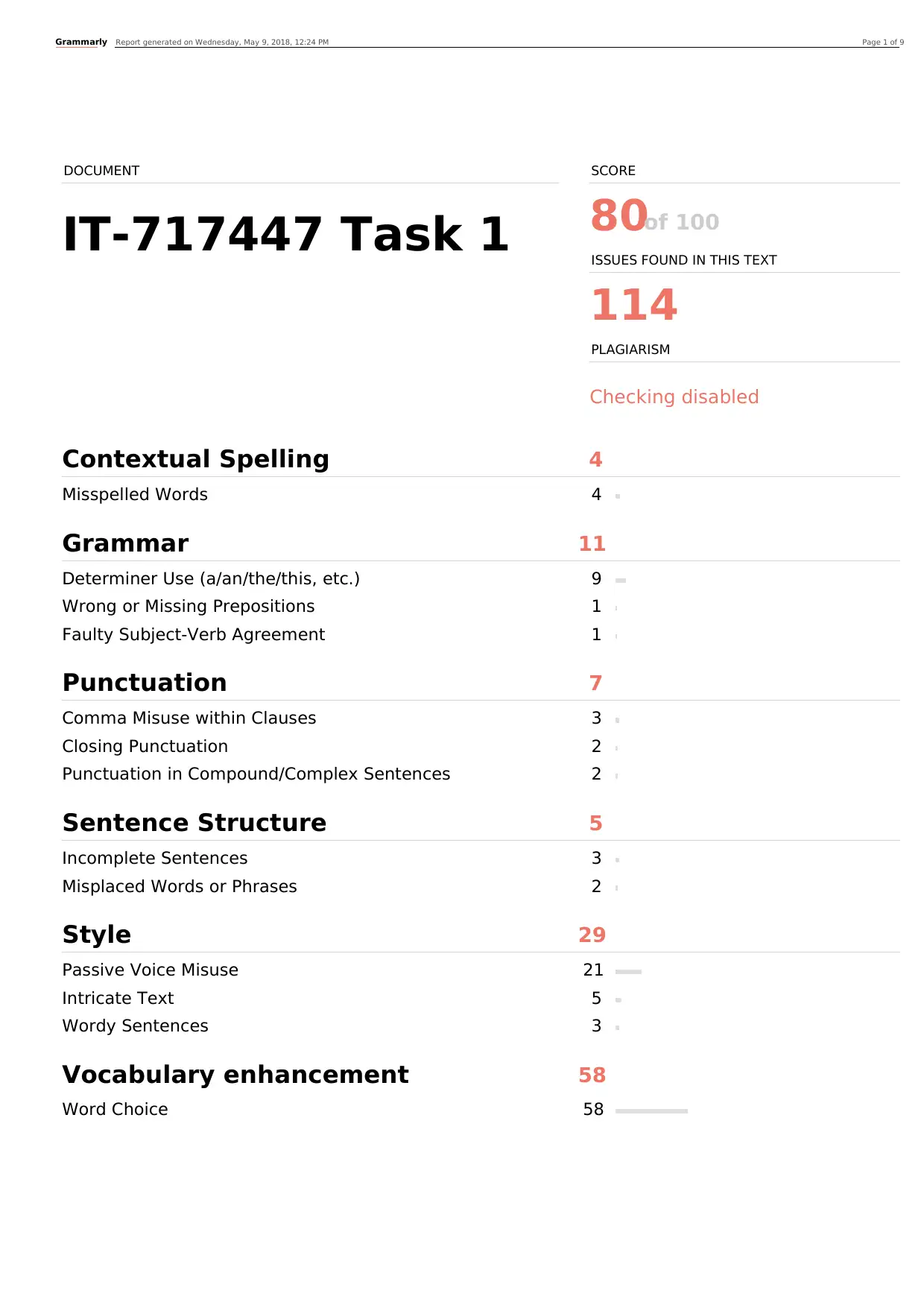
Grammarly Report generated on Wednesday, May 9, 2018, 12:24 PM Page 1 of 9
4
9
1
1
3
2
2
3
2
21
5
3
58
DOCUMENT
IT-717447 Task 1
SCORE
80
ISSUES FOUND IN THIS TEXT
114
PLAGIARISM
Checking disabled
Contextual Spelling 4
Misspelled Words
Grammar 11
Determiner Use (a/an/the/this, etc.)
Wrong or Missing Prepositions
Faulty Subject-Verb Agreement
Punctuation 7
Comma Misuse within Clauses
Closing Punctuation
Punctuation in Compound/Complex Sentences
Sentence Structure 5
Incomplete Sentences
Misplaced Words or Phrases
Style 29
Passive Voice Misuse
Intricate Text
Wordy Sentences
Vocabulary enhancement 58
Word Choice
of 100
4
9
1
1
3
2
2
3
2
21
5
3
58
DOCUMENT
IT-717447 Task 1
SCORE
80
ISSUES FOUND IN THIS TEXT
114
PLAGIARISM
Checking disabled
Contextual Spelling 4
Misspelled Words
Grammar 11
Determiner Use (a/an/the/this, etc.)
Wrong or Missing Prepositions
Faulty Subject-Verb Agreement
Punctuation 7
Comma Misuse within Clauses
Closing Punctuation
Punctuation in Compound/Complex Sentences
Sentence Structure 5
Incomplete Sentences
Misplaced Words or Phrases
Style 29
Passive Voice Misuse
Intricate Text
Wordy Sentences
Vocabulary enhancement 58
Word Choice
of 100
Paraphrase This Document
Need a fresh take? Get an instant paraphrase of this document with our AI Paraphraser
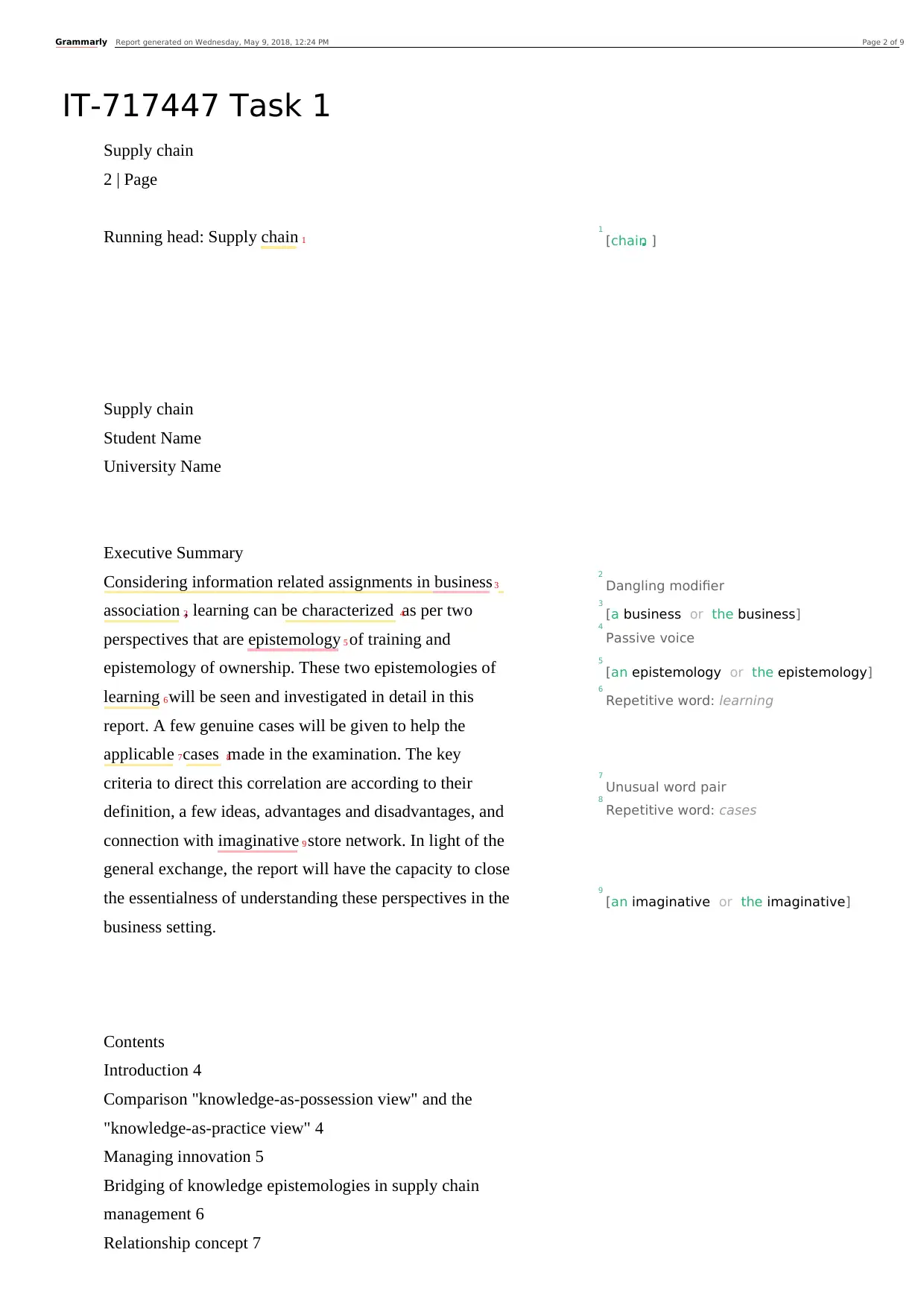
Grammarly Report generated on Wednesday, May 9, 2018, 12:24 PM Page 2 of 9
IT-717447 Task 1
Supply chain
2 | Page
Running head: Supply chain
Supply chain
Student Name
University Name
Executive Summary
Considering information related assignments in business
association , learning can be characterized as per two
perspectives that are epistemology of training and
epistemology of ownership. These two epistemologies of
learning will be seen and investigated in detail in this
report. A few genuine cases will be given to help the
applicable cases made in the examination. The key
criteria to direct this correlation are according to their
definition, a few ideas, advantages and disadvantages, and
connection with imaginative store network. In light of the
general exchange, the report will have the capacity to close
the essentialness of understanding these perspectives in the
business setting.
Contents
Introduction 4
Comparison "knowledge-as-possession view" and the
"knowledge-as-practice view" 4
Managing innovation 5
Bridging of knowledge epistemologies in supply chain
management 6
Relationship concept 7
1
3
2 4
5
6
7 8
9
1
[chain ].
2
Dangling modifier
3
[a business or the business]
4
Passive voice
5
[an epistemology or the epistemology]
6
Repetitive word: learning
7
Unusual word pair
8
Repetitive word: cases
9
[an imaginative or the imaginative]
IT-717447 Task 1
Supply chain
2 | Page
Running head: Supply chain
Supply chain
Student Name
University Name
Executive Summary
Considering information related assignments in business
association , learning can be characterized as per two
perspectives that are epistemology of training and
epistemology of ownership. These two epistemologies of
learning will be seen and investigated in detail in this
report. A few genuine cases will be given to help the
applicable cases made in the examination. The key
criteria to direct this correlation are according to their
definition, a few ideas, advantages and disadvantages, and
connection with imaginative store network. In light of the
general exchange, the report will have the capacity to close
the essentialness of understanding these perspectives in the
business setting.
Contents
Introduction 4
Comparison "knowledge-as-possession view" and the
"knowledge-as-practice view" 4
Managing innovation 5
Bridging of knowledge epistemologies in supply chain
management 6
Relationship concept 7
1
3
2 4
5
6
7 8
9
1
[chain ].
2
Dangling modifier
3
[a business or the business]
4
Passive voice
5
[an epistemology or the epistemology]
6
Repetitive word: learning
7
Unusual word pair
8
Repetitive word: cases
9
[an imaginative or the imaginative]
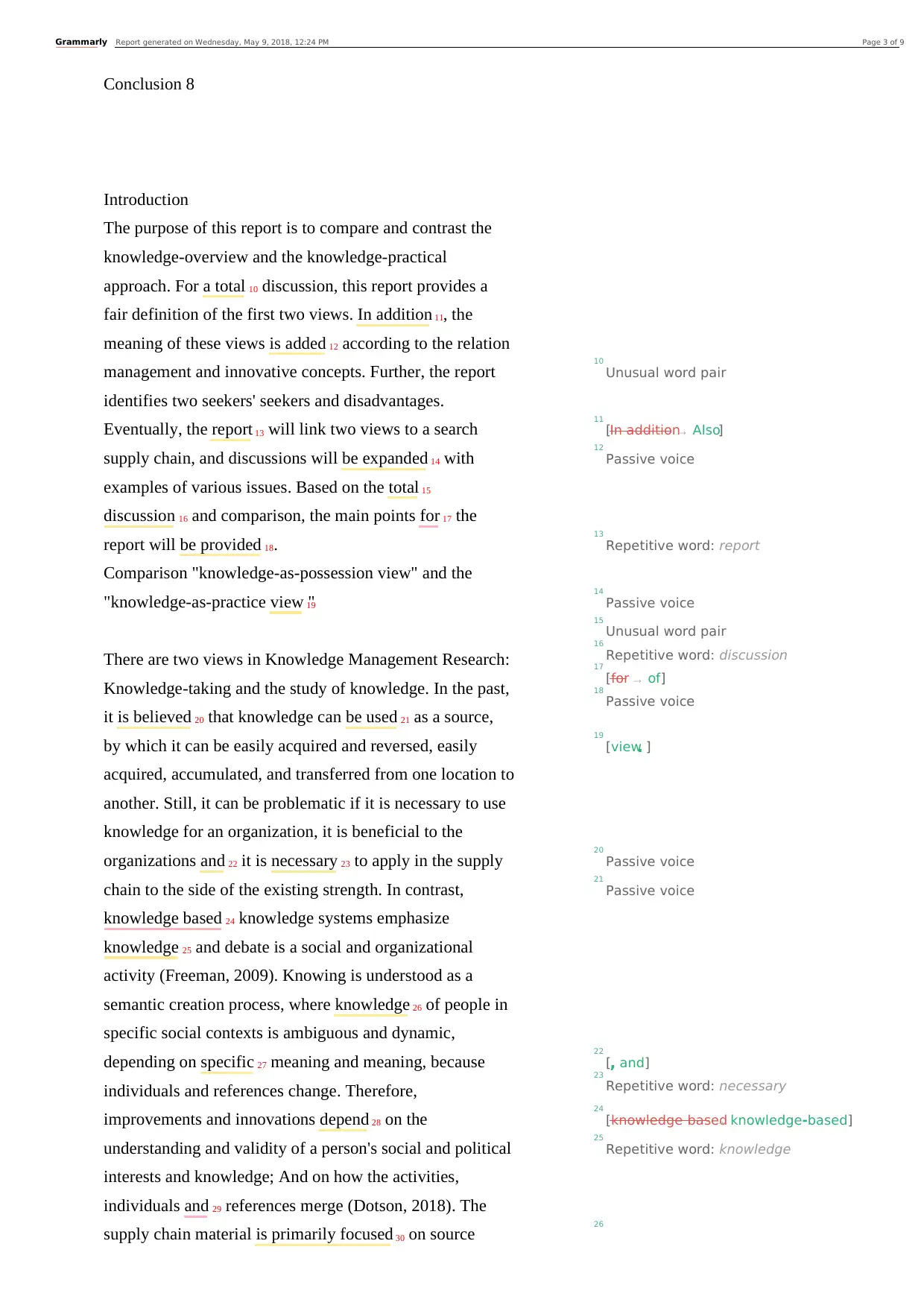
Grammarly Report generated on Wednesday, May 9, 2018, 12:24 PM Page 3 of 9
Conclusion 8
Introduction
The purpose of this report is to compare and contrast the
knowledge-overview and the knowledge-practical
approach. For a total discussion, this report provides a
fair definition of the first two views. In addition , the
meaning of these views is added according to the relation
management and innovative concepts. Further, the report
identifies two seekers' seekers and disadvantages.
Eventually, the report will link two views to a search
supply chain, and discussions will be expanded with
examples of various issues. Based on the total
discussion and comparison, the main points for the
report will be provided .
Comparison "knowledge-as-possession view" and the
"knowledge-as-practice view "
There are two views in Knowledge Management Research:
Knowledge-taking and the study of knowledge. In the past,
it is believed that knowledge can be used as a source,
by which it can be easily acquired and reversed, easily
acquired, accumulated, and transferred from one location to
another. Still, it can be problematic if it is necessary to use
knowledge for an organization, it is beneficial to the
organizations and it is necessary to apply in the supply
chain to the side of the existing strength. In contrast,
knowledge based knowledge systems emphasize
knowledge and debate is a social and organizational
activity (Freeman, 2009). Knowing is understood as a
semantic creation process, where knowledge of people in
specific social contexts is ambiguous and dynamic,
depending on specific meaning and meaning, because
individuals and references change. Therefore,
improvements and innovations depend on the
understanding and validity of a person's social and political
interests and knowledge; And on how the activities,
individuals and references merge (Dotson, 2018). The
supply chain material is primarily focused on source
10
11
12
13
14
15
16 17
18
19
20 21
22 23
24
25
26
27
28
29
30
10
Unusual word pair
11
[ ]
12
Passive voice
13
Repetitive word: report
14
Passive voice
15
Unusual word pair
16
Repetitive word: discussion
17
[for of]→
18
Passive voice
19
[view ].
20
Passive voice
21
Passive voice
22
[ and],
23
Repetitive word: necessary
24
[knowledge based knowledge-based]→
25
Repetitive word: knowledge
26
In addition Also→
Conclusion 8
Introduction
The purpose of this report is to compare and contrast the
knowledge-overview and the knowledge-practical
approach. For a total discussion, this report provides a
fair definition of the first two views. In addition , the
meaning of these views is added according to the relation
management and innovative concepts. Further, the report
identifies two seekers' seekers and disadvantages.
Eventually, the report will link two views to a search
supply chain, and discussions will be expanded with
examples of various issues. Based on the total
discussion and comparison, the main points for the
report will be provided .
Comparison "knowledge-as-possession view" and the
"knowledge-as-practice view "
There are two views in Knowledge Management Research:
Knowledge-taking and the study of knowledge. In the past,
it is believed that knowledge can be used as a source,
by which it can be easily acquired and reversed, easily
acquired, accumulated, and transferred from one location to
another. Still, it can be problematic if it is necessary to use
knowledge for an organization, it is beneficial to the
organizations and it is necessary to apply in the supply
chain to the side of the existing strength. In contrast,
knowledge based knowledge systems emphasize
knowledge and debate is a social and organizational
activity (Freeman, 2009). Knowing is understood as a
semantic creation process, where knowledge of people in
specific social contexts is ambiguous and dynamic,
depending on specific meaning and meaning, because
individuals and references change. Therefore,
improvements and innovations depend on the
understanding and validity of a person's social and political
interests and knowledge; And on how the activities,
individuals and references merge (Dotson, 2018). The
supply chain material is primarily focused on source
10
11
12
13
14
15
16 17
18
19
20 21
22 23
24
25
26
27
28
29
30
10
Unusual word pair
11
[ ]
12
Passive voice
13
Repetitive word: report
14
Passive voice
15
Unusual word pair
16
Repetitive word: discussion
17
[for of]→
18
Passive voice
19
[view ].
20
Passive voice
21
Passive voice
22
[ and],
23
Repetitive word: necessary
24
[knowledge based knowledge-based]→
25
Repetitive word: knowledge
26
In addition Also→
⊘ This is a preview!⊘
Do you want full access?
Subscribe today to unlock all pages.

Trusted by 1+ million students worldwide
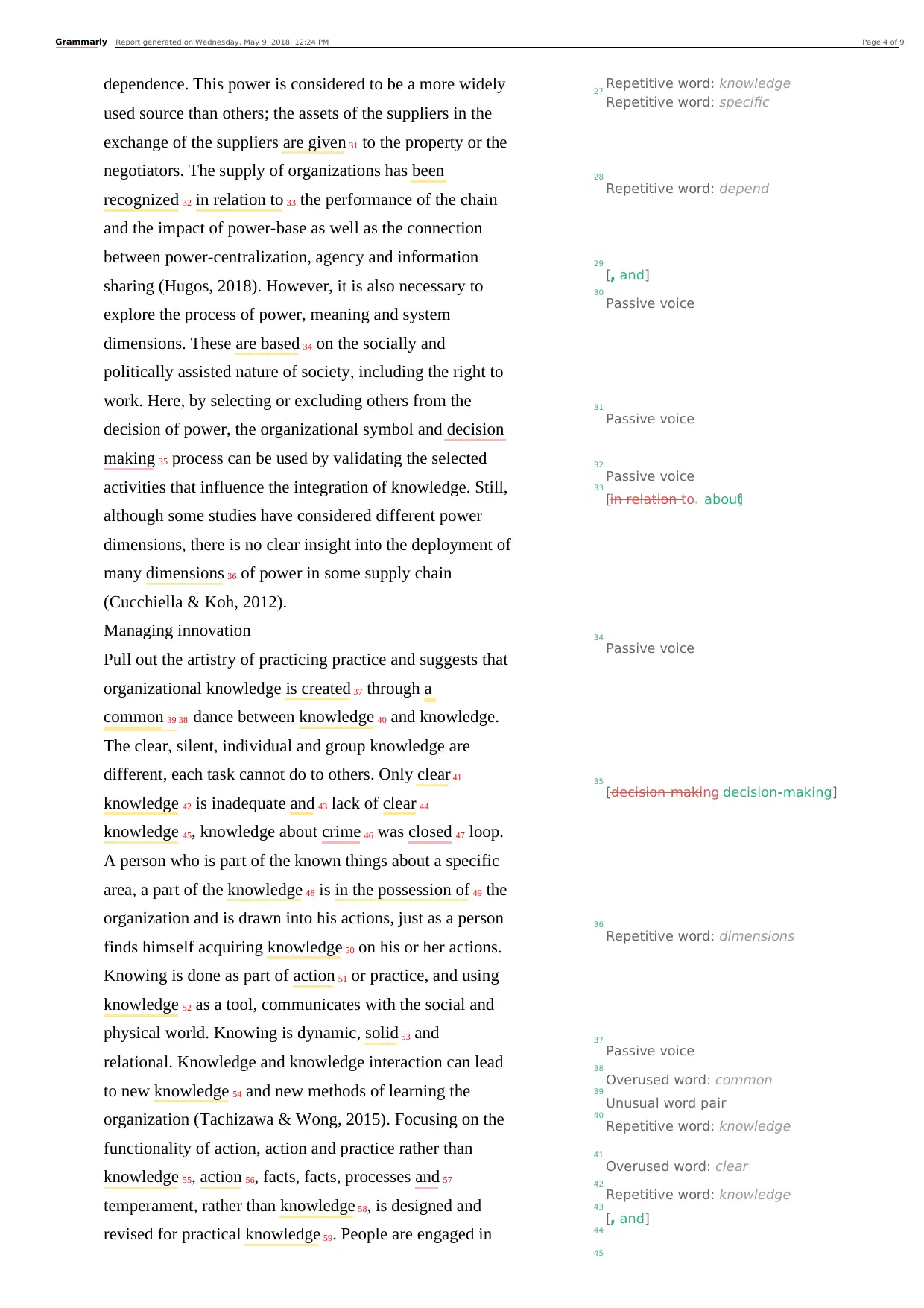
Grammarly Report generated on Wednesday, May 9, 2018, 12:24 PM Page 4 of 9
dependence. This power is considered to be a more widely
used source than others; the assets of the suppliers in the
exchange of the suppliers are given to the property or the
negotiators. The supply of organizations has been
recognized in relation to the performance of the chain
and the impact of power-base as well as the connection
between power-centralization, agency and information
sharing (Hugos, 2018). However, it is also necessary to
explore the process of power, meaning and system
dimensions. These are based on the socially and
politically assisted nature of society, including the right to
work. Here, by selecting or excluding others from the
decision of power, the organizational symbol and decision
making process can be used by validating the selected
activities that influence the integration of knowledge. Still,
although some studies have considered different power
dimensions, there is no clear insight into the deployment of
many dimensions of power in some supply chain
(Cucchiella & Koh, 2012).
Managing innovation
Pull out the artistry of practicing practice and suggests that
organizational knowledge is created through a
common dance between knowledge and knowledge.
The clear, silent, individual and group knowledge are
different, each task cannot do to others. Only clear
knowledge is inadequate and lack of clear
knowledge , knowledge about crime was closed loop.
A person who is part of the known things about a specific
area, a part of the knowledge is in the possession of the
organization and is drawn into his actions, just as a person
finds himself acquiring knowledge on his or her actions.
Knowing is done as part of action or practice, and using
knowledge as a tool, communicates with the social and
physical world. Knowing is dynamic, solid and
relational. Knowledge and knowledge interaction can lead
to new knowledge and new methods of learning the
organization (Tachizawa & Wong, 2015). Focusing on the
functionality of action, action and practice rather than
knowledge , action , facts, facts, processes and
temperament, rather than knowledge , is designed and
revised for practical knowledge . People are engaged in
31
32 33
34
35
36
37
39 38 40
41
42 43 44
45 46 47
48 49
50
51
52
53
54
55 56 57
58
59
Repetitive word: knowledge27
Repetitive word: specific
28
Repetitive word: depend
29
[ and],
30
Passive voice
31
Passive voice
32
Passive voice
33
[ ]
34
Passive voice
35
[decision making decision-making]→
36
Repetitive word: dimensions
37
Passive voice
38
Overused word: common
39
Unusual word pair
40
Repetitive word: knowledge
41
Overused word: clear
42
Repetitive word: knowledge
43
[ and],
44
45
in relation to about→
dependence. This power is considered to be a more widely
used source than others; the assets of the suppliers in the
exchange of the suppliers are given to the property or the
negotiators. The supply of organizations has been
recognized in relation to the performance of the chain
and the impact of power-base as well as the connection
between power-centralization, agency and information
sharing (Hugos, 2018). However, it is also necessary to
explore the process of power, meaning and system
dimensions. These are based on the socially and
politically assisted nature of society, including the right to
work. Here, by selecting or excluding others from the
decision of power, the organizational symbol and decision
making process can be used by validating the selected
activities that influence the integration of knowledge. Still,
although some studies have considered different power
dimensions, there is no clear insight into the deployment of
many dimensions of power in some supply chain
(Cucchiella & Koh, 2012).
Managing innovation
Pull out the artistry of practicing practice and suggests that
organizational knowledge is created through a
common dance between knowledge and knowledge.
The clear, silent, individual and group knowledge are
different, each task cannot do to others. Only clear
knowledge is inadequate and lack of clear
knowledge , knowledge about crime was closed loop.
A person who is part of the known things about a specific
area, a part of the knowledge is in the possession of the
organization and is drawn into his actions, just as a person
finds himself acquiring knowledge on his or her actions.
Knowing is done as part of action or practice, and using
knowledge as a tool, communicates with the social and
physical world. Knowing is dynamic, solid and
relational. Knowledge and knowledge interaction can lead
to new knowledge and new methods of learning the
organization (Tachizawa & Wong, 2015). Focusing on the
functionality of action, action and practice rather than
knowledge , action , facts, facts, processes and
temperament, rather than knowledge , is designed and
revised for practical knowledge . People are engaged in
31
32 33
34
35
36
37
39 38 40
41
42 43 44
45 46 47
48 49
50
51
52
53
54
55 56 57
58
59
Repetitive word: knowledge27
Repetitive word: specific
28
Repetitive word: depend
29
[ and],
30
Passive voice
31
Passive voice
32
Passive voice
33
[ ]
34
Passive voice
35
[decision making decision-making]→
36
Repetitive word: dimensions
37
Passive voice
38
Overused word: common
39
Unusual word pair
40
Repetitive word: knowledge
41
Overused word: clear
42
Repetitive word: knowledge
43
[ and],
44
45
in relation to about→
Paraphrase This Document
Need a fresh take? Get an instant paraphrase of this document with our AI Paraphraser
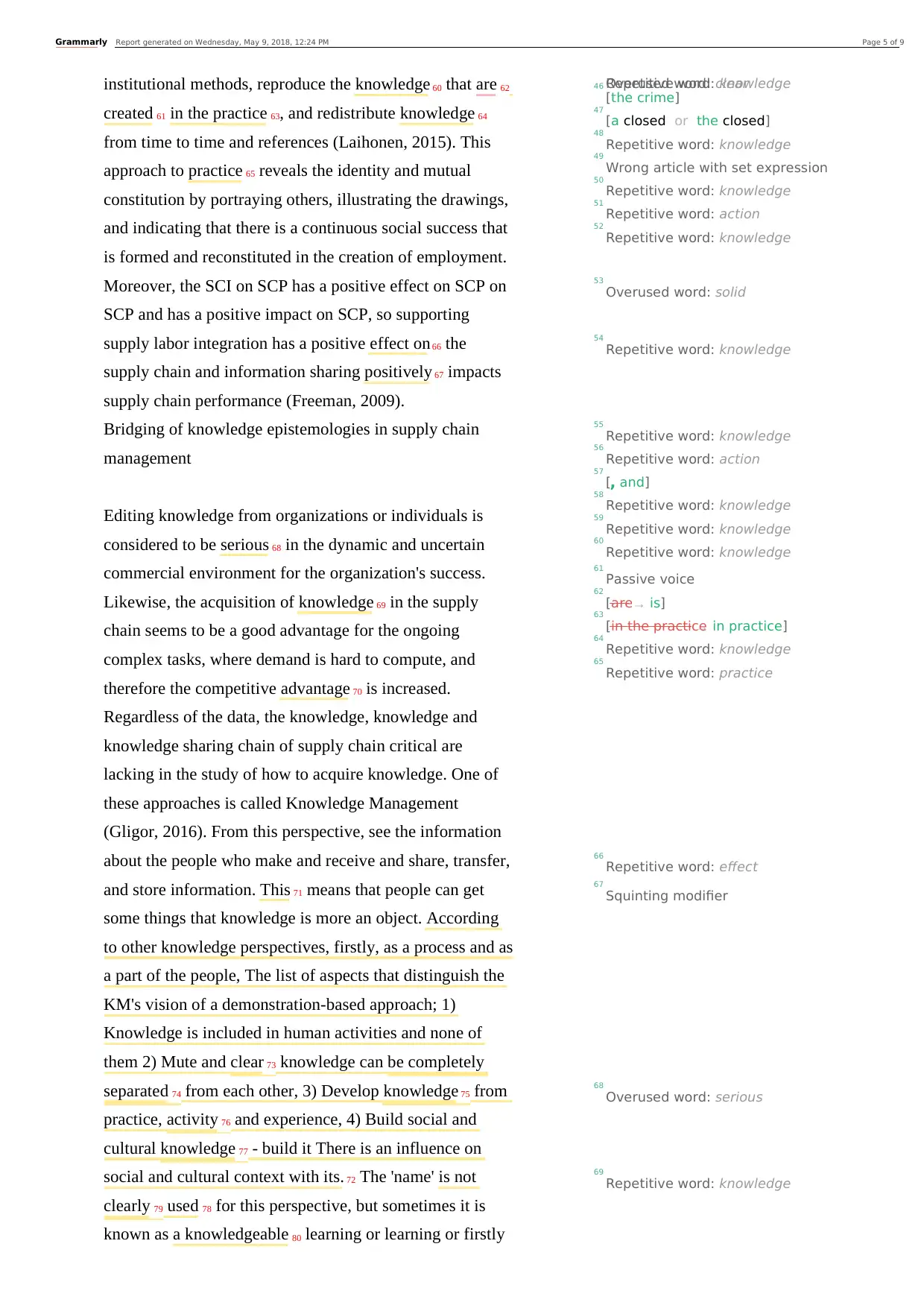
Grammarly Report generated on Wednesday, May 9, 2018, 12:24 PM Page 5 of 9
institutional methods, reproduce the knowledge that are
created in the practice , and redistribute knowledge
from time to time and references (Laihonen, 2015). This
approach to practice reveals the identity and mutual
constitution by portraying others, illustrating the drawings,
and indicating that there is a continuous social success that
is formed and reconstituted in the creation of employment.
Moreover, the SCI on SCP has a positive effect on SCP on
SCP and has a positive impact on SCP, so supporting
supply labor integration has a positive effect on the
supply chain and information sharing positively impacts
supply chain performance (Freeman, 2009).
Bridging of knowledge epistemologies in supply chain
management
Editing knowledge from organizations or individuals is
considered to be serious in the dynamic and uncertain
commercial environment for the organization's success.
Likewise, the acquisition of knowledge in the supply
chain seems to be a good advantage for the ongoing
complex tasks, where demand is hard to compute, and
therefore the competitive advantage is increased.
Regardless of the data, the knowledge, knowledge and
knowledge sharing chain of supply chain critical are
lacking in the study of how to acquire knowledge. One of
these approaches is called Knowledge Management
(Gligor, 2016). From this perspective, see the information
about the people who make and receive and share, transfer,
and store information. This means that people can get
some things that knowledge is more an object. According
to other knowledge perspectives, firstly, as a process and as
a part of the people, The list of aspects that distinguish the
KM's vision of a demonstration-based approach; 1)
Knowledge is included in human activities and none of
them 2) Mute and clear knowledge can be completely
separated from each other, 3) Develop knowledge from
practice, activity and experience, 4) Build social and
cultural knowledge - build it There is an influence on
social and cultural context with its. The 'name' is not
clearly used for this perspective, but sometimes it is
known as a knowledgeable learning or learning or firstly
60 62
61 63 64
65
66
67
68
69
70
71
73
74 75
76
77
72
79 78
80
Overused word: clearRepetitive word: knowledge46
[the crime]
47
[a closed or the closed]
48
Repetitive word: knowledge
49
Wrong article with set expression
50
Repetitive word: knowledge
51
Repetitive word: action
52
Repetitive word: knowledge
53
Overused word: solid
54
Repetitive word: knowledge
55
Repetitive word: knowledge
56
Repetitive word: action
57
[ and],
58
Repetitive word: knowledge
59
Repetitive word: knowledge
60
Repetitive word: knowledge
61
Passive voice
62
[are is]→
63
[in the practice in practice]→
64
Repetitive word: knowledge
65
Repetitive word: practice
66
Repetitive word: effect
67
Squinting modifier
68
Overused word: serious
69
Repetitive word: knowledge
institutional methods, reproduce the knowledge that are
created in the practice , and redistribute knowledge
from time to time and references (Laihonen, 2015). This
approach to practice reveals the identity and mutual
constitution by portraying others, illustrating the drawings,
and indicating that there is a continuous social success that
is formed and reconstituted in the creation of employment.
Moreover, the SCI on SCP has a positive effect on SCP on
SCP and has a positive impact on SCP, so supporting
supply labor integration has a positive effect on the
supply chain and information sharing positively impacts
supply chain performance (Freeman, 2009).
Bridging of knowledge epistemologies in supply chain
management
Editing knowledge from organizations or individuals is
considered to be serious in the dynamic and uncertain
commercial environment for the organization's success.
Likewise, the acquisition of knowledge in the supply
chain seems to be a good advantage for the ongoing
complex tasks, where demand is hard to compute, and
therefore the competitive advantage is increased.
Regardless of the data, the knowledge, knowledge and
knowledge sharing chain of supply chain critical are
lacking in the study of how to acquire knowledge. One of
these approaches is called Knowledge Management
(Gligor, 2016). From this perspective, see the information
about the people who make and receive and share, transfer,
and store information. This means that people can get
some things that knowledge is more an object. According
to other knowledge perspectives, firstly, as a process and as
a part of the people, The list of aspects that distinguish the
KM's vision of a demonstration-based approach; 1)
Knowledge is included in human activities and none of
them 2) Mute and clear knowledge can be completely
separated from each other, 3) Develop knowledge from
practice, activity and experience, 4) Build social and
cultural knowledge - build it There is an influence on
social and cultural context with its. The 'name' is not
clearly used for this perspective, but sometimes it is
known as a knowledgeable learning or learning or firstly
60 62
61 63 64
65
66
67
68
69
70
71
73
74 75
76
77
72
79 78
80
Overused word: clearRepetitive word: knowledge46
[the crime]
47
[a closed or the closed]
48
Repetitive word: knowledge
49
Wrong article with set expression
50
Repetitive word: knowledge
51
Repetitive word: action
52
Repetitive word: knowledge
53
Overused word: solid
54
Repetitive word: knowledge
55
Repetitive word: knowledge
56
Repetitive word: action
57
[ and],
58
Repetitive word: knowledge
59
Repetitive word: knowledge
60
Repetitive word: knowledge
61
Passive voice
62
[are is]→
63
[in the practice in practice]→
64
Repetitive word: knowledge
65
Repetitive word: practice
66
Repetitive word: effect
67
Squinting modifier
68
Overused word: serious
69
Repetitive word: knowledge
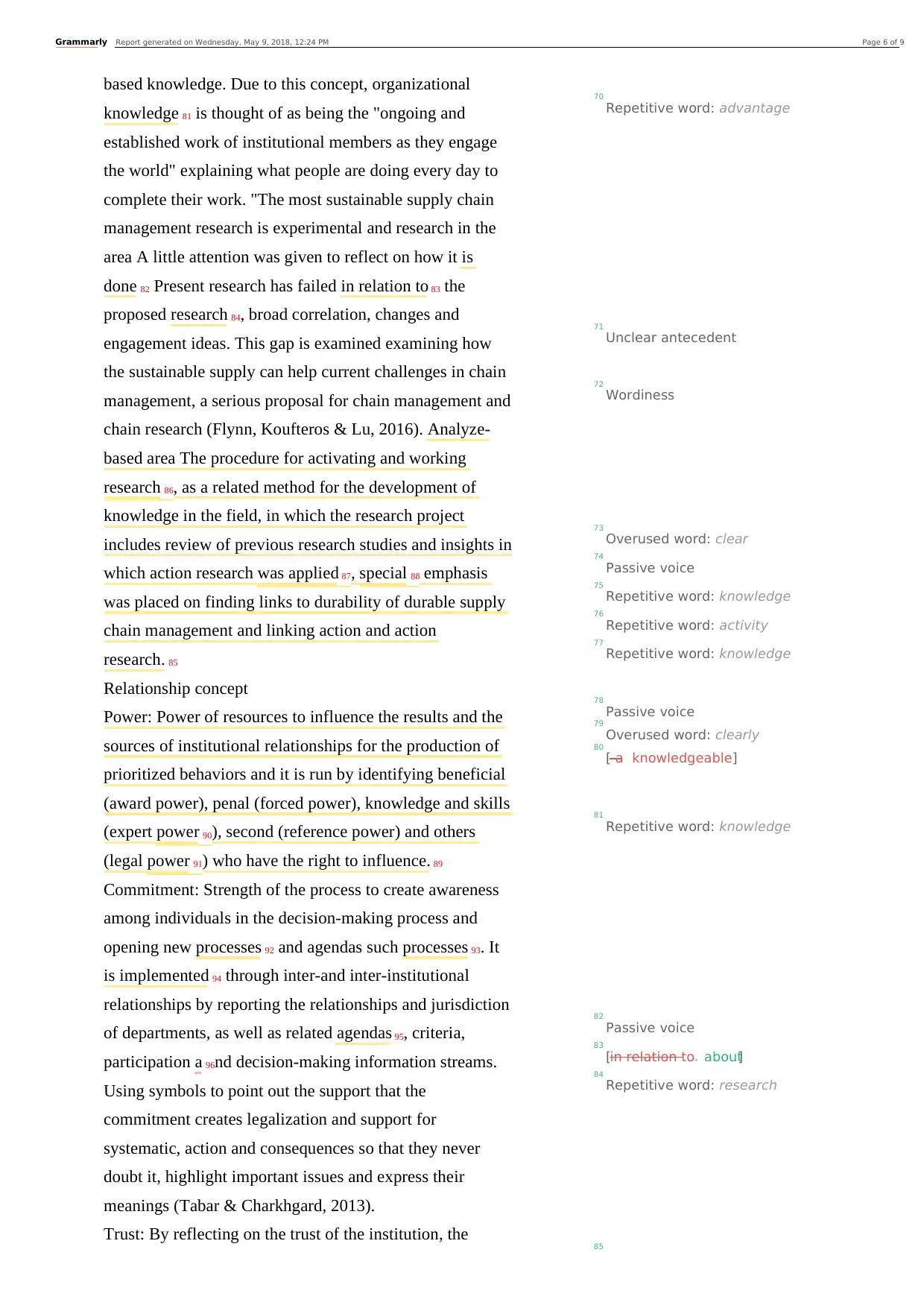
Grammarly Report generated on Wednesday, May 9, 2018, 12:24 PM Page 6 of 9
based knowledge. Due to this concept, organizational
knowledge is thought of as being the "ongoing and
established work of institutional members as they engage
the world" explaining what people are doing every day to
complete their work. "The most sustainable supply chain
management research is experimental and research in the
area A little attention was given to reflect on how it is
done Present research has failed in relation to the
proposed research , broad correlation, changes and
engagement ideas. This gap is examined examining how
the sustainable supply can help current challenges in chain
management, a serious proposal for chain management and
chain research (Flynn, Koufteros & Lu, 2016). Analyze-
based area The procedure for activating and working
research , as a related method for the development of
knowledge in the field, in which the research project
includes review of previous research studies and insights in
which action research was applied , special emphasis
was placed on finding links to durability of durable supply
chain management and linking action and action
research.
Relationship concept
Power: Power of resources to influence the results and the
sources of institutional relationships for the production of
prioritized behaviors and it is run by identifying beneficial
(award power), penal (forced power), knowledge and skills
(expert power ), second (reference power) and others
(legal power ) who have the right to influence.
Commitment: Strength of the process to create awareness
among individuals in the decision-making process and
opening new processes and agendas such processes . It
is implemented through inter-and inter-institutional
relationships by reporting the relationships and jurisdiction
of departments, as well as related agendas , criteria,
participation a nd decision-making information streams.
Using symbols to point out the support that the
commitment creates legalization and support for
systematic, action and consequences so that they never
doubt it, highlight important issues and express their
meanings (Tabar & Charkhgard, 2013).
Trust: By reflecting on the trust of the institution, the
81
82 83
84
86
87 88
85
90
91 89
92 93
94
95
96
70
Repetitive word: advantage
71
Unclear antecedent
72
Wordiness
73
Overused word: clear
74
Passive voice
75
Repetitive word: knowledge
76
Repetitive word: activity
77
Repetitive word: knowledge
78
Passive voice
79
Overused word: clearly
80
[ a knowledgeable]
81
Repetitive word: knowledge
82
Passive voice
83
[ ]
84
Repetitive word: research
85
in relation to about→
based knowledge. Due to this concept, organizational
knowledge is thought of as being the "ongoing and
established work of institutional members as they engage
the world" explaining what people are doing every day to
complete their work. "The most sustainable supply chain
management research is experimental and research in the
area A little attention was given to reflect on how it is
done Present research has failed in relation to the
proposed research , broad correlation, changes and
engagement ideas. This gap is examined examining how
the sustainable supply can help current challenges in chain
management, a serious proposal for chain management and
chain research (Flynn, Koufteros & Lu, 2016). Analyze-
based area The procedure for activating and working
research , as a related method for the development of
knowledge in the field, in which the research project
includes review of previous research studies and insights in
which action research was applied , special emphasis
was placed on finding links to durability of durable supply
chain management and linking action and action
research.
Relationship concept
Power: Power of resources to influence the results and the
sources of institutional relationships for the production of
prioritized behaviors and it is run by identifying beneficial
(award power), penal (forced power), knowledge and skills
(expert power ), second (reference power) and others
(legal power ) who have the right to influence.
Commitment: Strength of the process to create awareness
among individuals in the decision-making process and
opening new processes and agendas such processes . It
is implemented through inter-and inter-institutional
relationships by reporting the relationships and jurisdiction
of departments, as well as related agendas , criteria,
participation a nd decision-making information streams.
Using symbols to point out the support that the
commitment creates legalization and support for
systematic, action and consequences so that they never
doubt it, highlight important issues and express their
meanings (Tabar & Charkhgard, 2013).
Trust: By reflecting on the trust of the institution, the
81
82 83
84
86
87 88
85
90
91 89
92 93
94
95
96
70
Repetitive word: advantage
71
Unclear antecedent
72
Wordiness
73
Overused word: clear
74
Passive voice
75
Repetitive word: knowledge
76
Repetitive word: activity
77
Repetitive word: knowledge
78
Passive voice
79
Overused word: clearly
80
[ a knowledgeable]
81
Repetitive word: knowledge
82
Passive voice
83
[ ]
84
Repetitive word: research
85
in relation to about→
⊘ This is a preview!⊘
Do you want full access?
Subscribe today to unlock all pages.

Trusted by 1+ million students worldwide
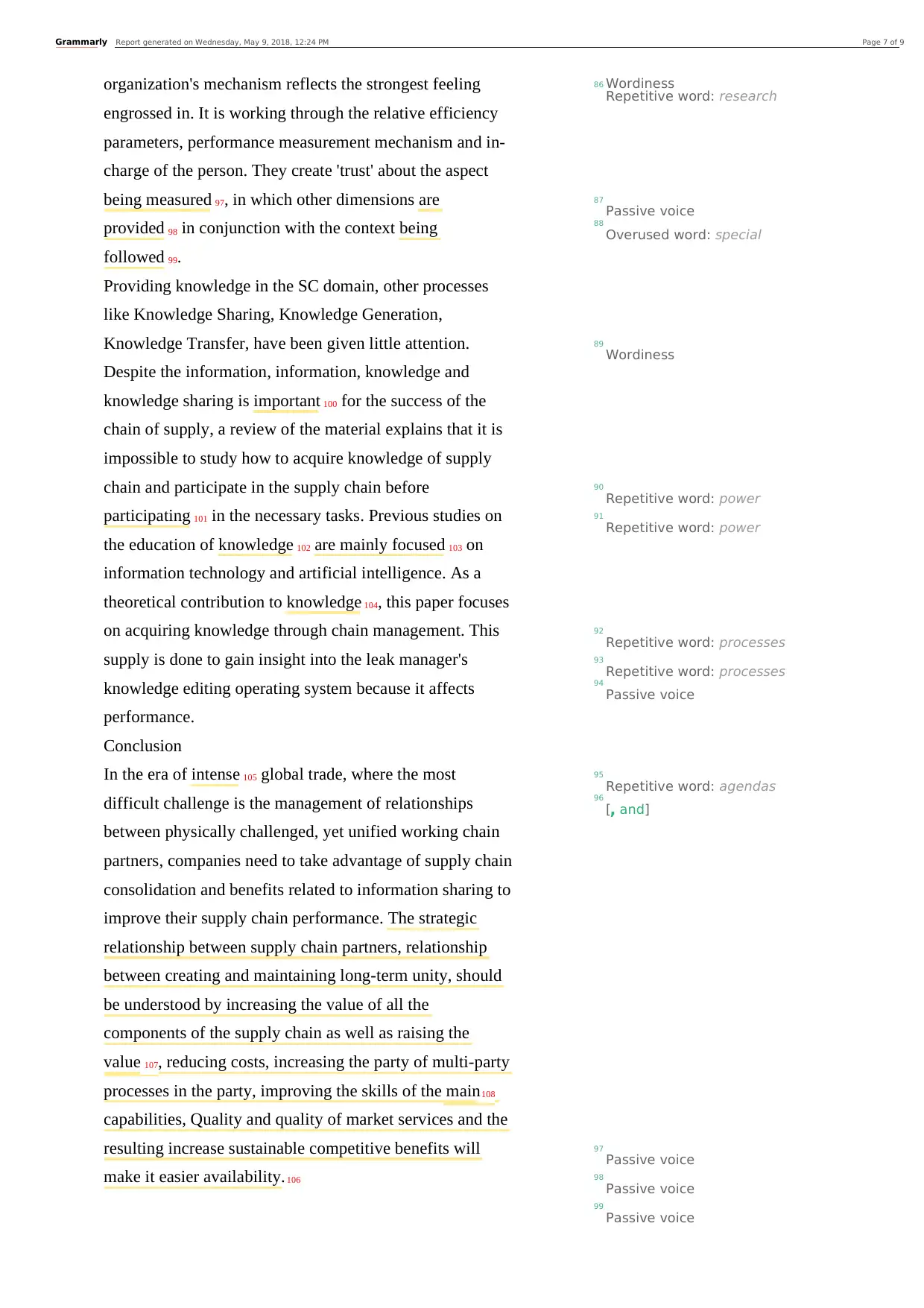
Grammarly Report generated on Wednesday, May 9, 2018, 12:24 PM Page 7 of 9
organization's mechanism reflects the strongest feeling
engrossed in. It is working through the relative efficiency
parameters, performance measurement mechanism and in-
charge of the person. They create 'trust' about the aspect
being measured , in which other dimensions are
provided in conjunction with the context being
followed .
Providing knowledge in the SC domain, other processes
like Knowledge Sharing, Knowledge Generation,
Knowledge Transfer, have been given little attention.
Despite the information, information, knowledge and
knowledge sharing is important for the success of the
chain of supply, a review of the material explains that it is
impossible to study how to acquire knowledge of supply
chain and participate in the supply chain before
participating in the necessary tasks. Previous studies on
the education of knowledge are mainly focused on
information technology and artificial intelligence. As a
theoretical contribution to knowledge , this paper focuses
on acquiring knowledge through chain management. This
supply is done to gain insight into the leak manager's
knowledge editing operating system because it affects
performance.
Conclusion
In the era of intense global trade, where the most
difficult challenge is the management of relationships
between physically challenged, yet unified working chain
partners, companies need to take advantage of supply chain
consolidation and benefits related to information sharing to
improve their supply chain performance. The strategic
relationship between supply chain partners, relationship
between creating and maintaining long-term unity, should
be understood by increasing the value of all the
components of the supply chain as well as raising the
value , reducing costs, increasing the party of multi-party
processes in the party, improving the skills of the main
capabilities, Quality and quality of market services and the
resulting increase sustainable competitive benefits will
make it easier availability.
97
98
99
100
101
102 103
104
105
107
108
106
Wordiness86
Repetitive word: research
87
Passive voice
88
Overused word: special
89
Wordiness
90
Repetitive word: power
91
Repetitive word: power
92
Repetitive word: processes
93
Repetitive word: processes
94
Passive voice
95
Repetitive word: agendas
96
[ and],
97
Passive voice
98
Passive voice
99
Passive voice
organization's mechanism reflects the strongest feeling
engrossed in. It is working through the relative efficiency
parameters, performance measurement mechanism and in-
charge of the person. They create 'trust' about the aspect
being measured , in which other dimensions are
provided in conjunction with the context being
followed .
Providing knowledge in the SC domain, other processes
like Knowledge Sharing, Knowledge Generation,
Knowledge Transfer, have been given little attention.
Despite the information, information, knowledge and
knowledge sharing is important for the success of the
chain of supply, a review of the material explains that it is
impossible to study how to acquire knowledge of supply
chain and participate in the supply chain before
participating in the necessary tasks. Previous studies on
the education of knowledge are mainly focused on
information technology and artificial intelligence. As a
theoretical contribution to knowledge , this paper focuses
on acquiring knowledge through chain management. This
supply is done to gain insight into the leak manager's
knowledge editing operating system because it affects
performance.
Conclusion
In the era of intense global trade, where the most
difficult challenge is the management of relationships
between physically challenged, yet unified working chain
partners, companies need to take advantage of supply chain
consolidation and benefits related to information sharing to
improve their supply chain performance. The strategic
relationship between supply chain partners, relationship
between creating and maintaining long-term unity, should
be understood by increasing the value of all the
components of the supply chain as well as raising the
value , reducing costs, increasing the party of multi-party
processes in the party, improving the skills of the main
capabilities, Quality and quality of market services and the
resulting increase sustainable competitive benefits will
make it easier availability.
97
98
99
100
101
102 103
104
105
107
108
106
Wordiness86
Repetitive word: research
87
Passive voice
88
Overused word: special
89
Wordiness
90
Repetitive word: power
91
Repetitive word: power
92
Repetitive word: processes
93
Repetitive word: processes
94
Passive voice
95
Repetitive word: agendas
96
[ and],
97
Passive voice
98
Passive voice
99
Passive voice
Paraphrase This Document
Need a fresh take? Get an instant paraphrase of this document with our AI Paraphraser
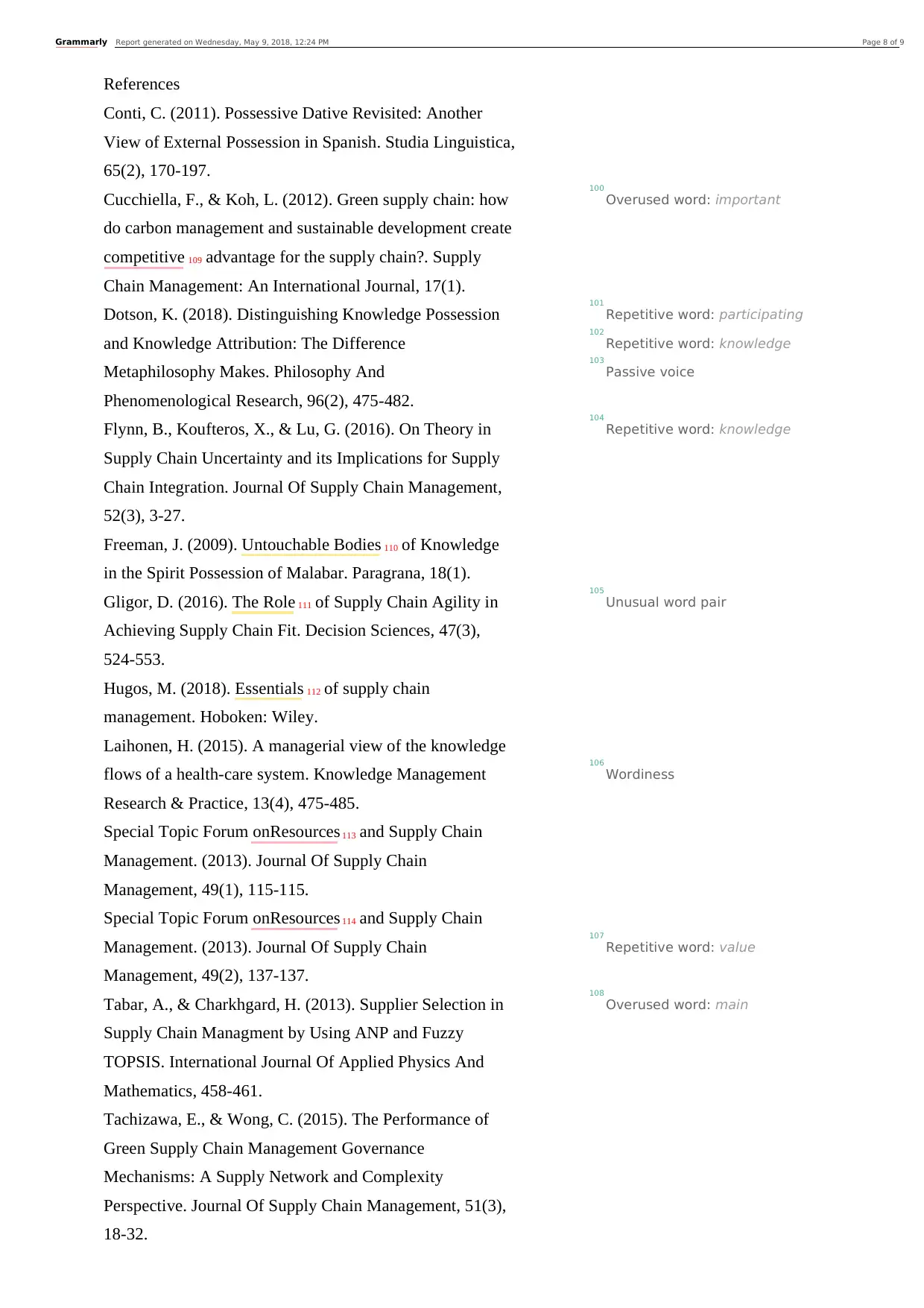
Grammarly Report generated on Wednesday, May 9, 2018, 12:24 PM Page 8 of 9
References
Conti, C. (2011). Possessive Dative Revisited: Another
View of External Possession in Spanish. Studia Linguistica,
65(2), 170-197.
Cucchiella, F., & Koh, L. (2012). Green supply chain: how
do carbon management and sustainable development create
competitive advantage for the supply chain?. Supply
Chain Management: An International Journal, 17(1).
Dotson, K. (2018). Distinguishing Knowledge Possession
and Knowledge Attribution: The Difference
Metaphilosophy Makes. Philosophy And
Phenomenological Research, 96(2), 475-482.
Flynn, B., Koufteros, X., & Lu, G. (2016). On Theory in
Supply Chain Uncertainty and its Implications for Supply
Chain Integration. Journal Of Supply Chain Management,
52(3), 3-27.
Freeman, J. (2009). Untouchable Bodies of Knowledge
in the Spirit Possession of Malabar. Paragrana, 18(1).
Gligor, D. (2016). The Role of Supply Chain Agility in
Achieving Supply Chain Fit. Decision Sciences, 47(3),
524-553.
Hugos, M. (2018). Essentials of supply chain
management. Hoboken: Wiley.
Laihonen, H. (2015). A managerial view of the knowledge
flows of a health-care system. Knowledge Management
Research & Practice, 13(4), 475-485.
Special Topic Forum onResources and Supply Chain
Management. (2013). Journal Of Supply Chain
Management, 49(1), 115-115.
Special Topic Forum onResources and Supply Chain
Management. (2013). Journal Of Supply Chain
Management, 49(2), 137-137.
Tabar, A., & Charkhgard, H. (2013). Supplier Selection in
Supply Chain Managment by Using ANP and Fuzzy
TOPSIS. International Journal Of Applied Physics And
Mathematics, 458-461.
Tachizawa, E., & Wong, C. (2015). The Performance of
Green Supply Chain Management Governance
Mechanisms: A Supply Network and Complexity
Perspective. Journal Of Supply Chain Management, 51(3),
18-32.
109
110
111
112
113
114
100
Overused word: important
101
Repetitive word: participating
102
Repetitive word: knowledge
103
Passive voice
104
Repetitive word: knowledge
105
Unusual word pair
106
Wordiness
107
Repetitive word: value
108
Overused word: main
References
Conti, C. (2011). Possessive Dative Revisited: Another
View of External Possession in Spanish. Studia Linguistica,
65(2), 170-197.
Cucchiella, F., & Koh, L. (2012). Green supply chain: how
do carbon management and sustainable development create
competitive advantage for the supply chain?. Supply
Chain Management: An International Journal, 17(1).
Dotson, K. (2018). Distinguishing Knowledge Possession
and Knowledge Attribution: The Difference
Metaphilosophy Makes. Philosophy And
Phenomenological Research, 96(2), 475-482.
Flynn, B., Koufteros, X., & Lu, G. (2016). On Theory in
Supply Chain Uncertainty and its Implications for Supply
Chain Integration. Journal Of Supply Chain Management,
52(3), 3-27.
Freeman, J. (2009). Untouchable Bodies of Knowledge
in the Spirit Possession of Malabar. Paragrana, 18(1).
Gligor, D. (2016). The Role of Supply Chain Agility in
Achieving Supply Chain Fit. Decision Sciences, 47(3),
524-553.
Hugos, M. (2018). Essentials of supply chain
management. Hoboken: Wiley.
Laihonen, H. (2015). A managerial view of the knowledge
flows of a health-care system. Knowledge Management
Research & Practice, 13(4), 475-485.
Special Topic Forum onResources and Supply Chain
Management. (2013). Journal Of Supply Chain
Management, 49(1), 115-115.
Special Topic Forum onResources and Supply Chain
Management. (2013). Journal Of Supply Chain
Management, 49(2), 137-137.
Tabar, A., & Charkhgard, H. (2013). Supplier Selection in
Supply Chain Managment by Using ANP and Fuzzy
TOPSIS. International Journal Of Applied Physics And
Mathematics, 458-461.
Tachizawa, E., & Wong, C. (2015). The Performance of
Green Supply Chain Management Governance
Mechanisms: A Supply Network and Complexity
Perspective. Journal Of Supply Chain Management, 51(3),
18-32.
109
110
111
112
113
114
100
Overused word: important
101
Repetitive word: participating
102
Repetitive word: knowledge
103
Passive voice
104
Repetitive word: knowledge
105
Unusual word pair
106
Wordiness
107
Repetitive word: value
108
Overused word: main
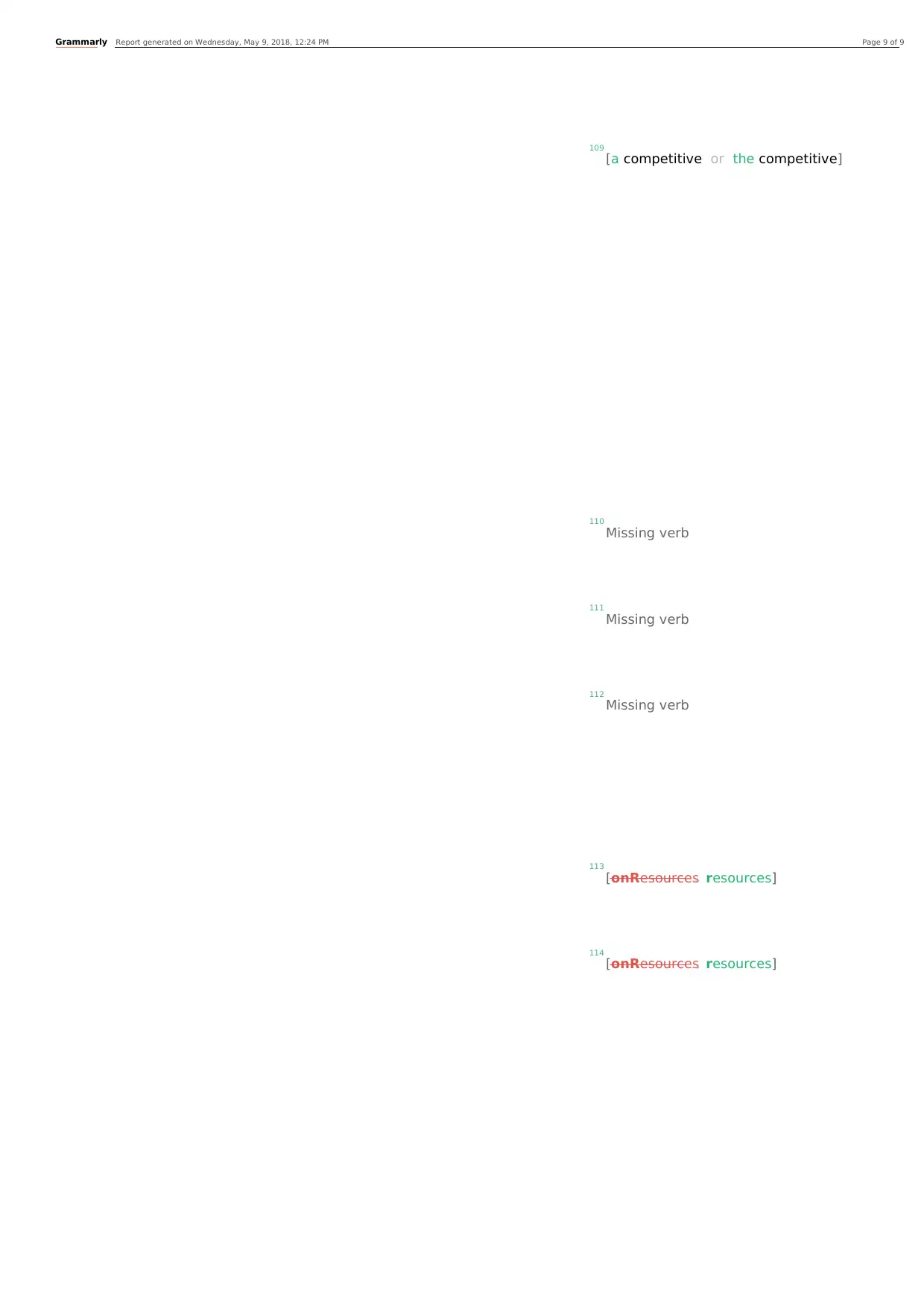
Grammarly Report generated on Wednesday, May 9, 2018, 12:24 PM Page 9 of 9
109
[a competitive or the competitive]
110
Missing verb
111
Missing verb
112
Missing verb
113
[onResources resources]→
114
[onResources resources]→
109
[a competitive or the competitive]
110
Missing verb
111
Missing verb
112
Missing verb
113
[onResources resources]→
114
[onResources resources]→
⊘ This is a preview!⊘
Do you want full access?
Subscribe today to unlock all pages.

Trusted by 1+ million students worldwide
1 out of 9
Related Documents
Your All-in-One AI-Powered Toolkit for Academic Success.
+13062052269
info@desklib.com
Available 24*7 on WhatsApp / Email
![[object Object]](/_next/static/media/star-bottom.7253800d.svg)
Unlock your academic potential
Copyright © 2020–2026 A2Z Services. All Rights Reserved. Developed and managed by ZUCOL.



